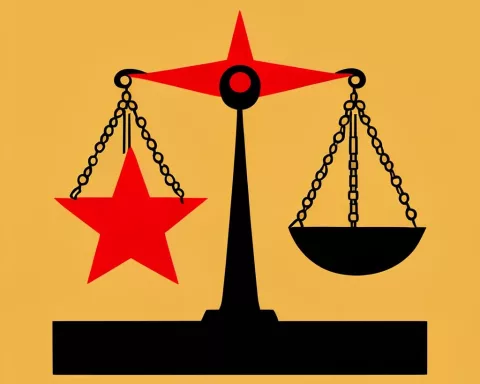Ebrahim Rasool’s return to South Africa is a powerful story of strength and hope. Greeted by a joyful crowd at Cape Town International Airport, he showed no regrets despite being expelled from the U.S. for criticizing a controversial political movement. His experience highlights the tension between South Africa and the U.S., showing how the country stands firm in its values, even when faced with challenges. Rasool’s journey reflects South Africa’s ongoing commitment to justice and equality, reminding everyone of its rich history and determination to overcome obstacles on the global stage.
What does Ebrahim Rasool’s story represent in South Africa’s diplomatic landscape?
Ebrahim Rasool’s story symbolizes resilience and South Africa’s commitment to justice in diplomacy. His expulsion from the U.S. highlights tensions in South Africa–U.S. relations, showcasing the balance between historical values and contemporary challenges in navigating global diplomacy.
A Hero’s Welcome in Cape Town
Ebrahim Rasool’s return to South Africa was marked by an air of determination and unwavering spirit. At Cape Town International Airport, a spirited crowd greeted the former South African ambassador to the United States, who, despite the circumstances of his homecoming, held his head high. “It was not our choice to come home, but we come home with no regrets,” Rasool declared, encapsulating the bittersweet nature of his return. This event carried profound personal and diplomatic significance, highlighting the current state of South Africa–U.S. relations.
The journey that led to Rasool’s expulsion from the United States began with his participation in a webinar organized by the Mapungubwe Institute for Strategic Reflection (Mistra). The webinar, titled “Implications of Changes in US Administrations for SA and Africa,” became a lightning rod for diplomatic controversy. During the discussion, Rasool offered a sharp critique of President Donald Trump’s Make America Great Again (MAGA) movement. He described it as a supremacist response to the growing diversity within the United States. This candid assessment did not sit well with U.S. Secretary of State Marco Rubio, who cited Rasool’s remarks as the reason for his expulsion.
Rasool’s expulsion is emblematic of the broader tensions between Washington and Pretoria. These diplomatic strains have been exacerbated by U.S. policy decisions that have not always aligned with South Africa’s values and interests. One of the most contentious points arose when Trump decided to cut financial aid to South Africa. He justified this action by alleging that the country’s land reform policies discriminated against white farmers. Trump’s invitation for South African farmers to relocate to the U.S., coupled with unsubstantiated claims of illegal land seizures, further widened the rift between the two nations.
Strained Diplomacy and Contentious Issues
The diplomatic fallout from Rasool’s expulsion is just one aspect of the deteriorating relationship between Washington and Pretoria. Tech entrepreneur Elon Musk, a South African-born figure now prominent in the U.S., accused the South African government of implementing “openly racist ownership laws.” These allegations added fuel to an already volatile situation, reigniting debates about historical injustices and the policies aimed at addressing them. The complex nature of these accusations highlights the ongoing challenges faced by post-apartheid South Africa in striking a balance between historical redress and present-day socio-economic issues.
South Africa’s legal battle against Israel at the International Court of Justice (ICJ) further complicates its diplomatic relations with the United States. Pretoria has accused Israel of committing genocidal acts in Gaza, a stance that has not been well-received by Washington, a staunch ally of Israel. This legal confrontation underscores South Africa’s commitment to its values on the international stage, even when such actions risk straining alliances with influential nations.
Despite the myriad challenges, South Africa remains committed to fostering a constructive relationship with the United States. As the current president of the Group of 20 (G20) leading economies, Pretoria places a high priority on diplomatic engagement. President Cyril Ramaphosa has announced plans to send a delegation of government and business representatives to the U.S. in an effort to rebuild and strengthen bilateral relations. With the U.S. set to assume the rotating G20 presidency next year, maintaining open channels of communication and cooperation is essential.
A Reflection of National Values
Rasool’s journey is not merely a personal narrative but also a reflection of the broader dynamics at play in South Africa’s foreign policy. His expulsion and subsequent return highlight the country’s steadfast commitment to defending its values, even in the face of diplomatic adversity. In a written statement, Rasool emphasized that while mending relations with Washington is important, it should not come “at the expense of our values.”
The vibrant scene at Cape Town International Airport, where Rasool’s supporters gathered to welcome him home, serves as a powerful testament to the national sentiment. It underscores a collective resolve to uphold the principles of justice and equality, which have long been integral to South Africa’s identity. This moment resonates deeply, echoing the nation’s historical struggles and triumphs as it transitioned from apartheid to a democratic society committed to human rights.
Rasool’s situation draws parallels with historical events that have shaped South Africa’s policies. The anti-apartheid movement, which faced international condemnation and eventually led to sanctions against South Africa, illustrates how external diplomatic pressures have historically influenced the country’s decisions. Similarly, Rasool’s expulsion, set against the backdrop of contested land reforms and international legal battles, highlights the enduring complexities of navigating global diplomacy while staying true to national values.
Cultural and Historical Context
Artistic expressions provide another lens through which to view these events. South African artists like William Kentridge have vividly depicted the nation’s tumultuous history through their work. Kentridge’s art, characterized by its poignant commentary on apartheid and its aftermath, mirrors the current socio-political landscape where historical injustices and contemporary policies intersect. These artistic narratives offer a cultural backdrop to the ongoing political drama, enriching our understanding of the complexities at play.
The discourse surrounding land reform in South Africa remains a deeply emotional and complex issue. These policies aim to address centuries of dispossession and inequality, but they also encounter significant resistance and misrepresentation on the international stage. The narrative propagated by Trump and echoed by Musk exemplifies how these policies can be misunderstood or misrepresented, fueling international tensions and complicating diplomatic efforts.
As Rasool prepares to submit his report on his expulsion to President Ramaphosa, the nation watches intently. This report will not only detail the specific events leading to his removal but also shed light on the broader implications for South Africa’s international relations. It will serve as a reflection of the nation’s unwavering commitment to its values, even as it navigates the complex waters of global diplomacy.
A Nation’s Journey
In this intricate dance of diplomacy, South Africa’s history serves as both a guide and a reminder. The lessons learned from past struggles for justice and equality inform current policies and stances. Rasool’s situation, viewed against this rich historical backdrop, underscores the ongoing journey of a nation striving to uphold its values on the global stage. This moment in history, much like many others in South Africa’s past, will be remembered as a testament to the country’s resilience and steadfast commitment to justice.
The homecoming of Ebrahim Rasool at Cape Town International Airport, marked by a blend of resilience and resolve, symbolizes more than just a personal return. It embodies the broader narrative of South Africa’s diplomatic challenges and triumphs. As the nation continues to navigate the complexities of international relations, it remains steadfast in its commitment to justice and equality, values that have long defined its identity on the global stage.
FAQ: Ebrahim Rasool and South Africa’s Diplomatic Landscape
What happened to Ebrahim Rasool that led to his expulsion from the U.S.?
Ebrahim Rasool was expelled from the U.S. after criticizing President Donald Trump’s MAGA movement during a webinar organized by the Mapungubwe Institute for Strategic Reflection. His remarks were deemed controversial and caught the attention of U.S. Secretary of State Marco Rubio, leading to his removal from the country.
How does Rasool’s story reflect the relationship between South Africa and the U.S.?
Rasool’s experience highlights the tensions in South Africa–U.S. relations, particularly regarding differing values and policies. His expulsion underscores the complexities of navigating diplomacy while maintaining South Africa’s commitment to justice and equality, even amidst challenging international dynamics.
What were the broader implications of Rasool’s return to South Africa?
Rasool’s return was celebrated by a large crowd, symbolizing national resilience and a commitment to uphold South Africa’s values. It also serves as a reminder of the ongoing diplomatic challenges faced by the country, particularly in light of its recent criticisms of U.S. policies and international legal battles, such as its position on Israel.
How did Rasool’s expulsion relate to historical issues in South Africa?
Rasool’s situation draws parallels with South Africa’s historical struggles against apartheid and ongoing efforts to address past injustices, particularly around land reform. His expulsion reflects broader themes of external diplomatic pressures that have historically influenced South Africa’s policies.
What actions is South Africa taking to improve its diplomatic relations with the U.S.?
South Africa is actively seeking to rebuild its relationship with the U.S., particularly as it holds the presidency of the G20. President Cyril Ramaphosa plans to send a delegation of government and business representatives to the U.S. to promote cooperation and dialogue, emphasizing the importance of maintaining open channels of communication.
How does art reflect the political climate surrounding Rasool’s narrative?
Artistic expressions from South African artists, such as William Kentridge, provide a cultural context for understanding the nation’s tumultuous history and contemporary issues. These artistic narratives often comment on historical injustices and current policies, enriching the discourse around events like Rasool’s expulsion and the ongoing struggles for justice and equality in South Africa.












